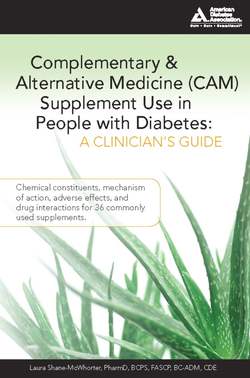Читать книгу Complementary and Alternative Medicine (CAM) Supplement Use in People with Diabetes: A Clinician's Guide - Laura Shane-McWhorter - Страница 12
На сайте Литреса книга снята с продажи.
CAM SUPPLEMENTS USED FOR DIABETES AND ITS COMPLICATIONS
ОглавлениеAlthough there are hundreds of different botanical and nonbotanical products to treat diabetes and its complications, this book will focus on some of the most well-known and commonly used products, roughly in order of popularity. A discussion of botanical or dietary sources, chemical constituents and mechanism of action, adverse effects and drug interactions, examples of the types of clinical studies that evaluate these substances, and an overall summary will be presented for each product.
Botanical biological complementary therapies used to lower blood glucose include cinnamon (Cinnamomum cassia), gymnema (Gymnema sylvestre R.Br.), fenugreek (Trigonella foenum-graecum), bitter melon (Momordica charantia), ginseng (Panax ginseng or Panax quinquefolius L.), nopal (Opuntia streptacantha), aloe (Aloe vera L.), banaba (Lagerstroemia speciosa L.), caiapo (Ipomoea batatas), ivy gourd (Coccinia indica), holy basil (Ocimum sanctum), Vijayasar (Pterocarpus marsupium Roxb. [Leguminoceae]), jambolan (Eugenia jambolana), blonde psyllium (Plantago ovata), glucomannan (Amorphophallus konjac K. Koch), guar gum (Cyamopsis tetragonolobus [L.] Taub), stevia (Stevia rebaudiana Bertoni), pine bark (Pinus pinaster), and tea (Camellia sinensis), which may include green, oolong, or black tea. Claims have been made for bilberry (Vaccinium myrtillus) and milk thistle (Silybum marianum), but there is less evidence for these and other products.
Nonbotanical biological complementary supplements that may lower blood glucose include chromium, vanadium, nicotinamide, magnesium, and coenzyme Q10.
Botanical and nonbotanical products thought to decrease the complications of diabetes include the vitamin-like substance alpha-lipoic acid, vitamin E, gamma-linolenic acid, ginkgo (Ginkgo biloba L.), fish oil, policosanol (Saccharum officinarum L.), garlic (Allium sativum), guggul (Commiphora mukul), and red yeast rice (Monascus purpureus Went). Another biological complementary product frequently used is St. John’s wort (Hypericum perforatum L.), which is used to treat some types of depression rather than diabetes. However, depression frequently occurs in diabetes patients and many clinicians consider this a complication of diabetes.
